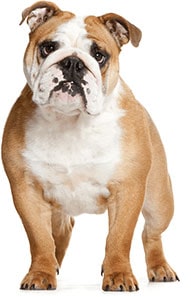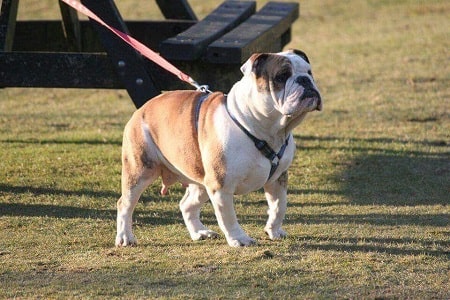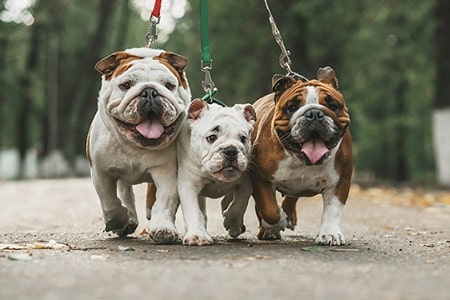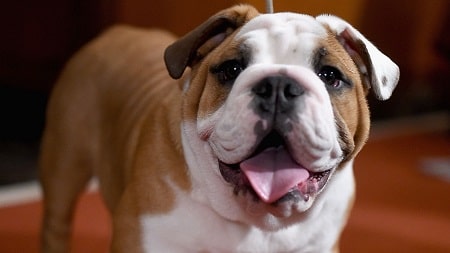The Bulldog, English Bulldog or the British bulldog is a fierce looking loving dog who loves everyone. This good-natured dog is a gentle family companion who was earlier bred to fight bulls. He has been made a mascot of a number of institutions. No other breed is admired for his loyalty as the bulldog. Moreover, it is also the national symbol of England.
Bulldog Breed Overview

| Group: | Non-sporting group |
| Size: | Medium-Large (40-50 pounds) |
| Lifespan: | 8-10 years |
| Best Suited For: | Families |
| Temperament: | Docile, Friendly, Wilful |
| Exercise Needs: | Low-Moderate |
| Drooling Potential: | High |
| Grooming Needs: | Low |
| Similar Breeds: | Pug, French bulldog, Boxer |
1. Basic Features
This dog with a wrinkled mug, distinctive underbite, and Churchillian jowls is short and sturdy. The Bulldogs have wide heads and shoulders. On the brow, they have thick folds of skin. Their eyes are wide-set, lips are drooping and teeth pointed.
A bulldog’s coat is short, flat, and sleek, with colors of red, fawn, white, brindle, and piebald. Their tail is naturally short. It may be curled or straight and is not docked.
Earlier the bulldog was used to drive cattle to market and to compete in bloody sports called bull baiting.
2. Bulldog Origin
The bulldog has been around for more than 500 years now. The term bulldog was first mentioned in literature around the 1500s. This dog was used in the sports bull baiting and thus the name bull. Bull-baiting reached the peak of its popularity in England in the early 1800s until it was made illegal along with other blood spots by the Cruelty to Animals Act 1835.
The ancestors of today’s bulldog were unbelievably brave and had huge jaws and were seemingly impervious to pain.
With bullbaiting obsolete, the Bulldog faced extinction. In response, Bulldog admirers began the long method of reworking the breed from belligerent to a companion. The physical features were refined and so was the temperament. The bulldog was made into a sweet, affectionate pet who loved children.
3. The Personality of Bulldog
Bulldogs are very intelligent dogs and are one of the most obedient dog breeds. Bulldogs are not barkers and love sending time with their people.
Their love for people, tolerant attitude towards children and an amiable temperament make them great pets for families with children. Also, they are great for anyone who avoids physical activity as they have a restful nature and may be called couch potatoes.
Bulldogs, make great watchdogs as well.
4. Bulldog Behavior

Breeders have worked well to remove aggression from Bulldogs. They are friendly and easygoing. Most of them are patient. However, they can be stubborn at times. Bulldogs love children and form a great bond with them. Due to this reason, they are recognized as great family pets.
Bulldogs get along with everyone including other animals and young children. They are very sociable and are known to be very sweet.
5. Exercise Requirements

Bulldogs like relaxing next to their owners’ feet. They enjoy short walks and a moderate exercise would help them stay fit. They stay well in cold weather. Thus, it is best to keep the dog inside during warm weather.
As they have a short muzzle, hot and humid weather makes it difficult for them to breathe. They don’t dissipate heat well and breathe heavily during hot weather. Bulldogs are susceptible to heatstrokes.
6. Diet Needs
Bulldogs, like other dogs, are omnivores and require a mixture of proteins, carbohydrates, fats, minerals, and vitamins. A balanced diet containing the essential nutrients in correct proportions and fresh water available at all times should be provided.
The dietary needs of your bulldog may depend on his present health, age and living conditions.
Bulldogs are also prone to becoming overweight so you should take special care that your Bulldog don’t overeat.
7. Trainability
Bulldogs are people pleasers and respond well to training. They are easy going and sweet. Early socialization is necessary for a well behaved dog. It is important to inculcate good manners in your dog through puppy training.
Bulldogs are chewers and will chew onto their toys for their entire life. It is very important to teach them to listen to commands. He might become protective of his food and belongings too. Proper training to avoid the same is necessary.
8. Common Health Problems
Bulldogs are prone to certain health conditions like all other breeds. Some of the Bulldogs are prone to interdigital cysts. These are the cysts that form between toes. These might cause discomfort in the dog but the condition is treatable.
Because of their short muzzle, they may suffer from respiratory problems. Allergies and hip issues are also common.
Another common condition is a cherry eye in which the gland under the third eyelid protrudes and looks like a cherry in the corner of the eye. However, you can seek the help of your vet for that. The cure is easy. Dry eye is another condition which is caused when natural tear production is inadequate.
9. Who Should Adopt a Bulldog?

Bulldog, with his amiable temperament and friendly personality, makes him perfect for all families. He makes a great companion for children and is great with even the younger ones. He puts up with other dogs and pets too.
Bulldogs are perfect for families with younger children.
Also, he does great in an apartment living. Being a couch potato, he loves resting next to his owner and requires little exercise. So if you’re someone who doesn’t prefer being in a very active lifestyle, a bulldog just might be right for you.
However, Bulldogs love their owners and will require love and attention from them. Giving your dog some extra attention will be just the right thing to do!
